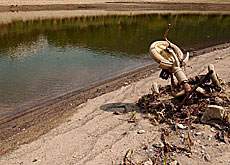Heat becomes a burning issue for the Swiss

Southern Switzerland has introduced speed limits of 80kmh on motorways in a bid to combat high ozone levels caused by the recent heatwave.
The move comes after temperatures in Locarno, canton Ticino, reached a record-breaking high of 37.9°C on Monday.
The normal speed limit on Swiss motorways is 120kmh.
The authorities said the speed limit would remain in place for a maximum of eight days and urged residents to leave their cars at home and either use public transport or walk.
The Ticino police said that so far Swiss motorists had largely observed the speed limit, which also applies to other main roads.
“Most of the cars that have overtaken us so far had foreign licence plates,” said Marco Guscio of the Ticino police.
Long-term measures
However, the federal road authorities have ruled out similar steps across the country as they feel that only long-term measures would be effective against high ozone levels.
“These measures should be introduced for at least two months and not only for a few days,” said Hansjörg Sommer of Zurich’s cantonal environment authority.
In July this year the Swiss environment ministry published a report on Switzerland’s ozone levels, which found that short-term measures were actually ineffective to combat summer smog.
In its report the ministry called for the long-term reduction of nitrogen oxide, which it said could be achieved by fitting diesel engines with special filters and offering tax incentives for cars with reduced emissions.
Forest fires
The heat has also contributed to the forest fires blazing in different parts of the country, which have caused considerable environmental damage.
Firefighters in the southern cantons of Ticino and Graubünden are continuing their efforts to combat several fires, which are believed to have been caused by lightning.
Elsewhere a massive blaze has destroyed thousands of square metres of a nature reserve in canton Vaud and authorities fear it will continue to spread.
Several cantons in central Switzerland have imposed campfire bans, telling people not to light cigarettes or have barbecues in the woods.
A number of cantons are also calling on residents to save water.
Too hot to work
As the heatwave continues, trade unions are calling for increased protection for workers.
Unions have urged the federal authorities to press employers to adhere to regulatory health measures for construction workers as well as for office employees.
They said room temperatures above 30°C posed a danger to people’s health and advised employees to avoid working in the afternoons.
Some of Switzerland’s schools have already introduced this measure, cancelling afternoon lessons.
Drowning victims
The scorching heat has also led to an increase in drowning deaths. According to the Swiss lifesaving association 53 people have died so far in Switzerland’s waters, 18 more than in the same period last year.
The association blamed the increasing number of non-swimmers trying to cool off in Switzerland’s lakes and rivers. It further said that many people jumped into cold water too quickly, which increases the danger of a circulatory collapse.
Meteorologists say the European heatwave is one of the five most severe in the last 150 years. However, forecasters are predicting lower temperatures by the end of this week.
swissinfo with agencies
On Monday the temperature reached a record 41.5°C in Grono in canton Graubünden.
In Locarno an all-time high of 37.9°C was recorded.
The southern canton of Ticino has imposed a speed limit of 80kmh to combat high ozone levels.
Several schools in Switzerland have cancelled afternoon lessons.
The hot weather looks set to continue until the end of the week.

In compliance with the JTI standards
More: SWI swissinfo.ch certified by the Journalism Trust Initiative












You can find an overview of ongoing debates with our journalists here . Please join us!
If you want to start a conversation about a topic raised in this article or want to report factual errors, email us at english@swissinfo.ch.